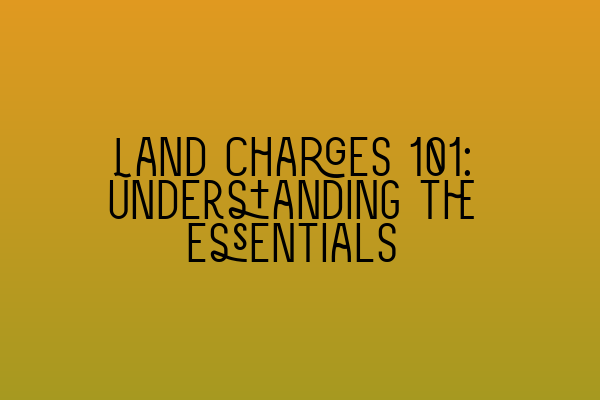Land Charges 101: Understanding the Essentials
As a solicitor practicing property law, it is essential to have a comprehensive understanding of land charges. Land charges are an integral part of property transactions, and having a solid grasp of the essentials will enable you to effectively advise your clients and protect their interests. In this blog post, we will explore the fundamentals of land charges, their significance, and how they impact property ownership.
What are Land Charges?
Land charges are legal interests or encumbrances that affect the ownership and use of a property. These charges are registered against the property itself and not against the person who owns it. Essentially, they are a means of documenting and protecting interests in land that may not otherwise be apparent to potential buyers or mortgage lenders.
Land charges provide important information about a property’s status, potential limitations, and any rights or obligations associated with it. Understanding and addressing these charges is crucial in ensuring a smooth and secure property transaction.
Types of Land Charges
There are several types of land charges that you may encounter in your practice. It is important to note that the types and classifications of land charges may vary depending on the jurisdiction. Here are a few common types of land charges:
1. Restrictive Covenants: These are obligations or restrictions imposed on a property by a previous owner to control its use. Restrictive covenants may dictate what can or cannot be done with the property, such as prohibiting certain activities or requiring architectural approval for any changes. Ensuring compliance with these covenants is crucial to avoid legal disputes.
2. Easements: Easements are rights granted to someone that allow them to use or access another person’s property for a specific purpose. Common examples include rights of way, drainage, or utility easements. When advising clients on property transactions, it is essential to identify and address any existing easements to prevent infringement or potential complications.
3. Mortgages: A mortgage is a charge against the property that secures a loan or debt. The mortgagee (usually a bank or other lending institution) has a legal interest in the property until the debt is fully repaid. It is crucial to conduct thorough due diligence to ensure that all mortgages on the property are identified and properly discharged during the transaction.
Impact on Property Ownership and Transactions
Land charges can significantly impact property ownership and transactions. Failing to recognize or address these charges can lead to legal disputes, financial liabilities, or complications during the transfer of property. As a solicitor, it is your responsibility to investigate and disclose any land charges that may affect your client’s interests.
When conducting property searches, it is important to explore the Land Charges Register, which contains details of registered land charges across England and Wales. This register includes information on restrictions, covenants, debts, easements, and other significant interests associated with the property. By thoroughly analyzing the register, you can provide accurate advice and ensure a smooth transaction for your clients.
Conclusion
Understanding land charges is an essential skill for any solicitor practicing property law. By familiarizing yourself with the various types of land charges and their implications, you can effectively protect your clients’ interests, avoid potential legal disputes, and ensure a successful property transaction.
Remember, staying knowledgeable about land charges and staying updated on changes in legislation is vital to provide effective legal advice. If you are preparing for the SQE exams or looking for further resources to enhance your understanding of property law and land law, check out these related articles:
– SQE 1 Practice Exam Questions: Test your knowledge and prepare for the SQE 1 exam with these practice exam questions. [link to article]
– SQE 1 Practice Mocks FLK1 FLK2: Get familiar with the format and structure of the SQE 1 exam by practicing with these mocks. [link to article]
– SQE 2 Preparation Courses: Prepare for the SQE 2 exam with comprehensive courses designed to enhance your understanding of property law and land law. [link to article]
– SQE 1 Preparation Courses: Strengthen your knowledge and skills in property law and land law with these specially crafted courses for SQE 1 preparation. [link to article]
– SRA SQE Exam Dates: Stay updated on the upcoming exam dates for the SRA SQE exams to plan your preparation effectively. [link to article]
By continuously expanding your knowledge and expertise in land charges and property law, you will be well-equipped to provide exceptional legal advice and support to your clients.
